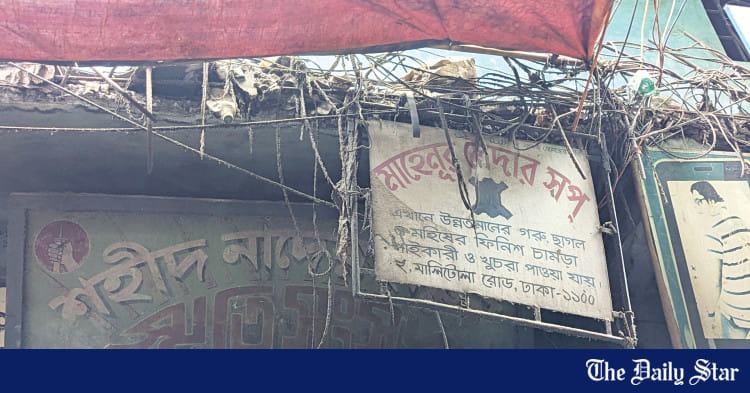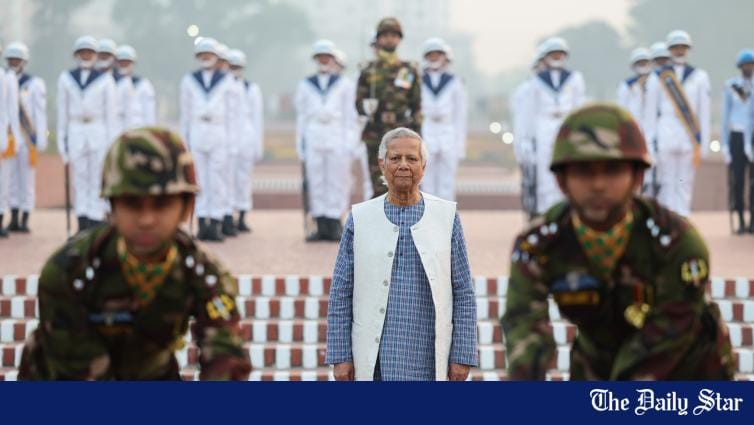The legend of Nader gunda
The tale of a fearless freedom fighter from Old Dhaka
This faded signboard in Malitola is the only record of Nader’s legacy.
Faruq Hossain, an elderly resident of Hoseni Dalan area in Old Dhaka, furrowed his brow when we asked him if he heard about Nader Mia from Malitola.
"Are you asking about Nader gunda? He was killed by the Pakistan military during the Liberation War. He was a fearless man. But I never saw him in person," he said.
Mohammad Afzal, another elderly man in his 70s from Urdu Road in the capital, gave a similar response. "The very mention of Nader's name would scare people."
Back in those days, "Nader Gunda from Malitola" was widely known in Old Dhaka. Many of those who had never seen him were also familiar with his name, according to Faruk, Afzal, and several other elderly people in the old town.
Ali Ahmad Ziauddin Bir Pratik, a freedom fighter from Crack Platoon, is also familiar with the heroic tales of Nader, who turned into a "freedom fighter from a street gangster" causing terror to the Pakistan army.
"After the crackdown, we went to India for training to join the war in the first week of April. Later, we returned and fought. But Nader and his gang put up resistance right from the beginning. On March 25 and 26, it was the civilians who put up the primary resistance at three locations in Dhaka. Among them, Nader and his group organised resistance on English Road in Bangshal," he said.
The two other resistance points were near Dhaka Central Jail and behind the Iqbal Hall (present Shaheed Sergeant Zahurul Haq Hall of Dhaka University), said Ziauddin, who too never seen Nader but was familiar with Nader's valiant fights during the war.
Monowara Akter
A TALE OF VALOUR
On the dark night of March 25, 1971, when the Pakistan forces launched their brutal massacre on unarmed, sleeping Bangalees, many fled the city, but Nader did not, multiple elderly locals said.
Sensing the situation early in the night, Nader took position on the rooftop of the Isha Brothers building in Bangshal with 8-10 of his associates, armed with a revolver and a double-barreled gun. He set up an ambush, waiting for the Pakistan forces, they said.
After midnight, Pakistani soldiers began torching the slums near the mosque at the Rai Saheb Bazar intersection. Then they moved on to set fire to the sawmills of Nayabazar. As soon as their jeeps came within Nader's ambush range, he and his companions opened fire, taking the enemy by surprise. Several Pakistani soldiers were killed in the sudden attack, they added.
However, as the Pakistani forces outnumbered them and were heavily armed, they quickly regained control. The soldiers retaliated with gunfire, but by then, Nader and his men had retreated.
The next morning, on March 26, Nader took his family to safety in Manikganj, and returned to Malitola, ready for the next fight.
No one among Nader's fellow freedom fighters is alive today. Elderly locals said they heard about Nader's incredible bravery from his fellow freedom fighters when they were alive.
Abdul Majid, a resident of Basabari Lane in Tanti Bazar, is one of them.
"At that time, a Bihari named 'Sangram' supplied weapons to Nader's group in exchange for a hefty sum of money. Initially, Nader purchased weapons using his own and his gang members' savings. But as their funds ran out, he started collecting donations from residents of different neighborhoods to buy weapons to fight Pakistani soldiers," he said.
By mid-April, as "Shanti Committees" started forming in various neighborhoods of Dhaka, Nader and his comrades had to restrict their movements for safety.
Several senior residents from Old Dhaka said that towards the end of May, the local Shanti Committee in Armanitola decided to hold a meeting where Khwaja Khair Uddin, the convener of Dhaka's Shanti Committee, would be present.
Abdullah Bulu
Nader and his associates bought some weapons from Sangram and planned an attack on the meeting.
On the scheduled day and time, Nader and his gang members took position near the Armenian Church at Armanitola. However, Sangram and a notorious gangster from Malitola, known as Geda, had already informed the Pakistani army about Nader's plan.
To deceive Nader and his group, the Pakistan military arrived in Armanitola in several microbus instead of a military jeep. Before Nader and his group could react, the Pakistani soldiers in plain clothes surrounded them from three sides and launched an attack, locals said, citing Nader's fellow freedom fighters.
Nader and his comrades retaliated, but by then, it was too late—the Pakistani soldiers had already surrounded them from all directions. Seeing this, Nader decided to retreat while firing back, along with his comrades. In the process, a bullet struck Nader's leg. By that time, most of his fellow freedom fighters had managed to reach safety.
"After being shot in the right leg, Nader crawled into Shabistan Cinema Hall. Then he climbed over a wall and escaped into the neighbouring house called 'Baghwala Bari'" said Munna Mia, 72, a resident of Malitola and Nader's cousin.
In a subsequent raid, the Pakistan troops along with local razakars interrogated the residents of the house who handed over Nader out of fear. He was then taken to the Dhaka Cantonment, Munna said.
"There, the Pakistan army tortured him and then killed him," he added, citing Nader's fellow freedom fighters.
These freedom fighters include Mohammad Ali from Alu Bazar, Sadek from Siddik Bazar, Chorui Saeed from Golok Pal Lane, Shamsu alias Cenghis Khan from Mirpur, Abdullah from Shyambazar, among others, locals said.
Recalling Nader's bravery, Nurul Mia, 90, a resident of Kalta Bazar, told The Daily Star, "I had a good acquaintance with a Pakistan army officer. He once told me—"if they had four more boys like Nader, the country would have gained independence much earlier."
The scene of Armanitola, where Nader fought his last battle and was eventually captured, has changed completely.
During a recent visit, The Daily Star found that the Bagh Bari no longer exists. Shabistan, the cinema hall, is also gone. In its place, several residential-cum-commercial buildings, including Protyasha Plaza, now stand tall.
RISE OF NADER
Nader Mia was born in Malitola in 1930s . His father was a court clerk, and Nader was his eldest son. He studied at Jagannath College and was involved with student politics.
However, before completing college, Nader became involved with local gangs. One of his closest associates was Dulu Gunda, who later became widely known as the famous actor Faruk. In an interview nine years ago on Somoy TV, Faruk himself revealed that between 1967 to 1971, there were 37 cases filed against him.
During the Non-Cooperation Movement in March 1971, shopkeepers in ration stores started hoarding goods to sell at higher prices, leading to a severe shortage of essential products. When the war broke out, Pakistani forces looted these ration shops. In this dire situation, Nader and his gang members broke into a ration store on Golak Pal Lane and distributed the stockpiled wheat, sugar, and rice among the local people, according to multiple elderly residents of Malitola.
"Nader may have had a bad reputation outside our neighbourhood, but within our community, he had immense respect for the elders. Words cannot describe the level of honour he showed them. He also cared deeply for us younger ones," said Mohammad Habib, a businessman from Shyambazar, who spent his childhood and teenage years in Malitola.
SHAHEED NADER'S FAMILY
Today, the only sign of his contribution is an old, dust-covered signboard:"Shaheed Nader Smriti Sangsad, Established in 1972."
Locals said one of Nader's brothers had established the club after independence, but it no longer functions. No photographs of Nader could be found there.
Locals said Nader's brother Harun was also killed during the war. Their remaining family members still live in Malitola. Two of his brothers are alive, but they declined to talk about Nader. Nader's wife and son now live in Keraniganj.
'LOVE' IN TIMES OF UPRISING
During the turbulent days of the mass uprising of 1969, all of Dhaka was in turmoil. In such an intense time, Nader went to visit his friend Habil's house in Shahjahanpur.
There, he became fond of a girl named Mary, whose father passed away and whose mother lived in Barishal. Habil's parents were raising her.
Having fallen in love with her, Nader proposed marriage to Habil's parents but they refused. Later that night, Nader and Mary eloped, got married and returned to Malitola. Initially, Nader's parents did not accept the marriage, but after a few days, they changed their minds.
After the marriage, Nader changed Mary's name to Monowara Akter.
Speaking to The Daily Star, Monowara, 70, said, "Everything was going well. Though people outside called him a gangster, he had a kind heart. He was always out all day. But he loved me very much."
But Monowara's happiness did not last long. Just two years after their marriage, war broke out and Nader joined the war, sending his wife to Manikganj. Monowara was five months into her pregnancy then. She received the news of her husband's death while in Manikganj.
Abdullah Bulu, Nader and Mary's only child was born during the war.
After the war, Monowara returned to Malitola with her infant son and later shifted to his brother's house in Keraniganj. Abdullah now runs a small business in Shyambazar and lives in Keraniganj.
"When people tell me, 'Your father did such courageous things,' I can't hold back my tears. My father gave his life for this country, but he was never truly honoured," Abdullah said, with his mother by his side.








